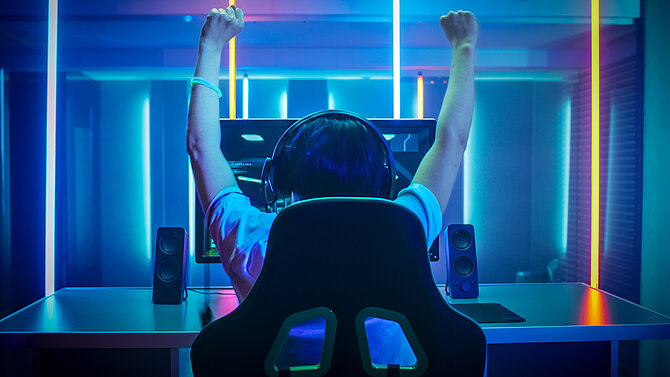Find out today what the legal world will be talking about tomorrow.

Because of the COVID-19 pandemic, the past months of lockdown and social distancing have brought a large part of our working and social life into the digital world at lightning speed. We got a glimpse of the possible real-virtual hybrid life in the not too distant future: how we will work, meet friends, play, shop or enjoy concerts. As those months have shown, it was mostly computer games that enabled their users during the pandemic to meet and share experiences despite physical distance.
The Metaverse: The pieces of the puzzle are ready
We already do a lot of our work digitally: thanks to cloud systems and instant messengers, we can work from anywhere; at Twitter nobody goes to the office anymore. Many people meet their friends online, in the past in chats, today on “Fortnite”: In April this year, rapper Travis Scott performed on “Fortnite”, and his 12 million viewers did not sit silently in the stands, but were able to interact with each other within the game environment during his performance. In March, on "Minecraft", the Reporters Without Borders' “Uncensored Library” opened its doors to provide people around the world with independent access to information. The online world is thus not only shifting familiar things - such as food shopping - from reality to digital space. It also creates and fulfills completely new needs.
However, all this also seems outdated: In the end, people still sit in front of a screen, as if in front of a window to the digital world, of which they are ultimately not a part of. And even if the technical barriers to access continue to fall (thanks to innovations such as cloudgaming), the user still needs a variety of systems and programs, such as a browser for shopping, a VoD platform for films, a console or gaming launcher for playing. At the same time, the “real” and the “digital” worlds are still largely separate - people play soccer either on the pitch or in “FIFA 20”, meet friends either in a bar or in “Fortnite”, marry in church or in “Animal Crossing: New Horizons”. And doesn't the aforementioned Travis Scott concert (still) look a bit like an interactive music video after all?
The picture is assembled
Visionaries have therefore long dreamed of a place that combines the real and digital worlds in real time, often called the Metaverse. The term goes back to Neal Stephenson's novel “Snow Crash” from the 90s. There, the protagonists of the plot repeatedly flee reality into the Metaverse, a mixture between the Internet and MMORPG (Massively Multiplayer Online Role-Playing Game), and move around with the help of avatars. The novel “Ready Player One” and its motion picture give a more modern example and an impression of what this can feel like.
According to today's understanding, the Metaverse essentially describes a virtual-real space that includes all virtual worlds as a further development of the Internet. It enables all people to participate live in a fully functioning economy. In his essay, blogger and investor Matthew Ball compares today's digital world with a shopping mall with countless stores whose products can neither be paid for with the same currency nor used together at the same time. In Metaverse, on the other hand, data, digital objects and content should be completely compatible with each other. A luxury watch purchased on Kurfürstendamm in Berlin may in the future be worn, sold or exchanged in “Counterstrike” or when attending a concert - whether digital or analog. Here, everyone is to create, own, invest and sell and be rewarded for an indefinable amount of "work" that is not to be done in digital or analog alone. What exactly the Metaverse will ultimately be, however, can hardly be guessed at this point in time and is being discussed accordingly. To approach it, it is helpful to look into Matthew Ball’s negative delimitation of what the Metaverse is not:
- It is not a virtual world like “Second Life” or “World of Warcraft”. Neither of them extend our current “universe”, but are ultimately only virtual, self-contained spaces.
- For the same reason, games or virtual reality as we know it today are not Metaverse. Here, too, humans merely have the simulated feeling of being in a digital world. The Metaverse may have some game-like goals and include games, but it is not a game itself and is not oriented towards specific goals.
- Neither is it a virtual theme park like in “Rick and Morty” or a new app store - it is not just for fun and entertainment.
The Metaverse is thus rather a virtual manifestation of reality with mutual interactions, as we know it from “Ready Player One” or “Matrix”. And there is no question that it will revolutionize not only the digital world but also large parts of the physical world and all services and platforms forever.
Gaming as the Big Bang?
As “Fortnite” or “Minecraft” show, the origin and driving force on the way to Metaverse is above all the gaming industry. This is hardly surprising, since it serves a target group with the highest technical demands and possibilities. The impact of the release of new tools and pieces is immense. Thus, the pressure from this industry for the other players is high. It remains to be seen who manages to set which technical standards in the near future.
And how will the existence of the Metaverse retoure eventually affect the gaming industry and especially the esports? The trend of the last few years to bring esports out of the Internet and into real arenas may be reversed. Watching an esport star playing in an arena on a screen still seems new today (at least in Europe), but in a few years’ time it might be a bit dusty, if the spectator can watch the competition live or in the map. With advancing technical development, the distinction between “real” and “electronic” sports, which already makes little sense, will become increasingly blurred - it is quite possible that a shooter in a Metaverse will become physically more strenuous than any real soccer game today. The tedious debate about whether or not esports is a “sport”, which only exists in Germany, may then perhaps disappear by itself.
Finally, let's take a brief look back at the beginnings of the Internet: In the mid-1990s, there was a serious discussion about whether the Internet was a lawless space in which existing laws could not be applied. Today, the discussion alone is no longer conceivable, and it will not rise again for the next evolutionary stage - the Metaverse. The legal challenges will be many and varied and will force us to rethink in many places, some of them will result in new regulations, but otherwise will apply what has long been the best strategy in real life: recognize legal issues and solve them smartly. Stay tuned.
Authors

